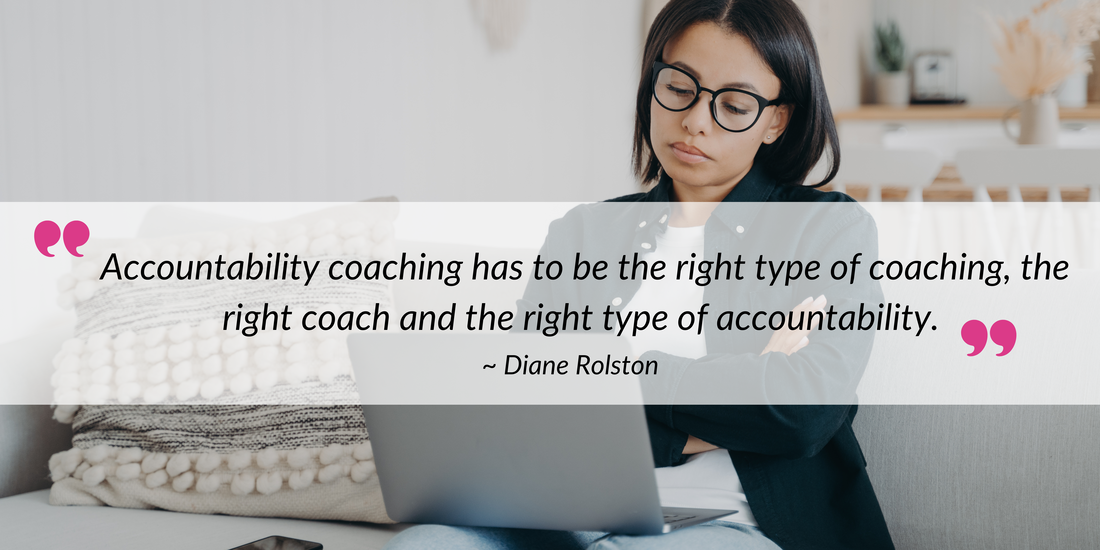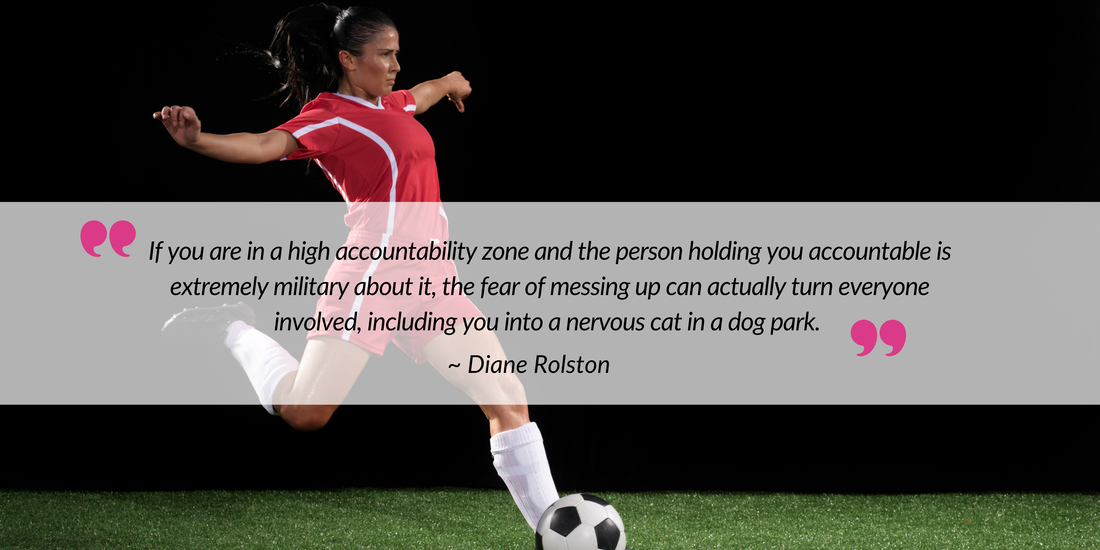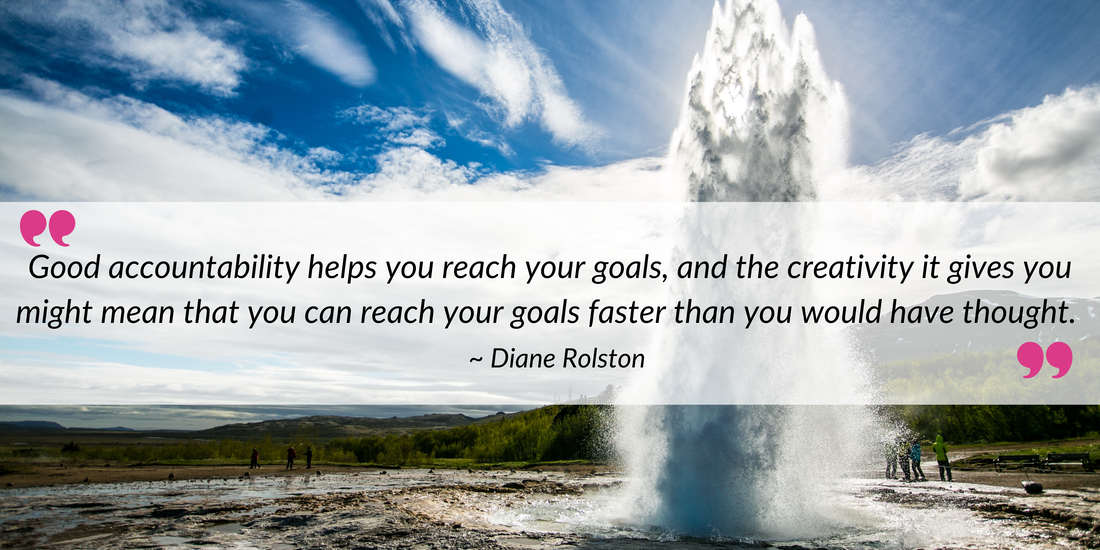|
In my previous blog, I discussed the power of accountability and mentioned that I could share its negative side and what you should avoid. I listened to you. You said:
I'm going to give you the five things around negative accountability that you should avoid. I'll throw in some stories along the way as well. Soccer and accountability If you didn't know, I play soccer. I play in a 30-something soccer league in North Vancouver, BC. It is filled with some ex-competitive players like myself and newbies, people who've never played before. Not every team has a coach, but we do. We like having a coach for trainings, warm-ups, and deciding who's on or not. I personally like having a coach for accountability. “Oh, Diane, why did you do that? Let's do this instead.” Also to talk things through with me to help me be a better player based on what's happening. Also accountability for the team, “You're not showing up on time? You don't get to start.” I love that part of accountability with having a coach. It helps us to step up into a better place, more peak performance, and such. I'm not going to go through them all because they’re in the previous blog. I encourage you to check it out. But after our latest game, as we're sitting around having a little social time with the team, there is a very high-level competitive league that was playing right after us. They are girls who are 10-12 years old or a little older. They were playing very seriously. They videotape the game so that they can go through the games after. I remember that from varsity rugby when I played for Western. We didn't have a video like this big pole thing that they do high-definition videoing. It’s very different. But we used to do stats. The stats were on:
All of these things, along with my kicking for posts, were tracked so that the coach could review them and then make an accountability plan for everyone. I'm watching this game with these girls. I know that there's going to be mega accountability after the game from watching the tape. Also, they said something like you can zoom in or tell the video to specifically look at one player, and it will track that player in the game. Pretty crazy. That’s high-level accountability. It’s great because it will help them be better players, learning from their mistakes. But what I heard from one team, with a group of coaches, was yelling.Lots and lots of yelling.
Sometimes sadly, it was conflicting. That made me also want to share that accountability coaching has to be the right coaching and the right type of accountability. This was not! Think about the times in your life when you've had the wrong accountability. Obviously, no accountability at all isn't good. I have accountability through coaches for so many areas of life. As you know my journey with my health and losing weight, I had a coach and a key part of their job was accountability. I now have a comedy coach who's helping me develop some sets for events or comedy shows that I've been doing, as well as putting it in keynotes. So I have deadlines when I have to have things done for them. That's all wonderful. Let's look at these five things and I want you to think:
Side note, I don't want to forget to tell you that She's Goaled 2.0 is open. It is a speed course to reach your goals. Every month, we have a new set of goals and weekly check-ins which help with accountability. There’s mastermind power with a supportive group of like-minded top achievers. As well as coaching support and strategy from me. Network growth on the Goal Sister calls where you connect with another woman in the group and have that accountability. Then at the end of the month, we look back and review:
Accountability is a big part of it, but it's done positively. The doors are open for that, and they close on May 16, 2024. I hope you'll join, as it’s a program I’m really proud of. Okay, let's go through the five. #1: Stress buffet Think of accountability like an overzealous diet. Everyone thinks it's going to make them healthier, but it's not because it ends up stressing you out. If we have too much accountability, then your workplace and your day-to-day life are going to feel like you're in a pressure cooker. There's no room for error. Everything is down to the tee. Then what does the pressure cooker do when it gets too much stress? It blows up. Imagine a geyser blowing. We actually had that happen on our kitchen ceiling. Soup had flown right up into the ceiling, leaving splotchy marks. We don't want to stress from too much accountability. There's that nice place where my clients say, “Oh, I just got everything done last night because I knew I was meeting you today.” Then there's the place where they say, “I was really sick. But I still did what I had to do, even though I was in the hospital because I knew I had to do it.” There's no room for error. We don't want you to be super stressed from accountability, but we want enough stress to push you to do something that you wouldn't normally do. With soccer, as I talked about in my previous blog, I do more because I have a coach or I do more because I have accountability. There's that nice amount that pushes you and stretches you a little bit, really you just want to be 1% better every single day. We don't want though the accountability to be turned up so high that you feel too much pressure and you're stressed out. #2: Confidence Killer When you're obsessed with following the rules, it can kill your confidence because you think, “Okay, this has to be. This has to be. This has to be this way, and this has to be this way.” Somebody's breathing down your neck. Accountability can actually turn negative. Then you're doubting yourself because it's so strict that you lose the confidence that naturally would be intuitive to you, your skills, and your talents. We don't want there to be too much in following the rules because that will kill your confidence. What I like to do with my clients is if their homework is not going to get done, I ask them to email me saying, “Hey, Diane, this homework is not going to get done because these other opportunities came up and I had to put them first. This actually is a better idea. I'm not going to do that homework. I'm going to do this instead to reach the same goal.” Perfect. Okay. Cool, good plan. That's what I want to hear. Or “Hey, Diane, I know I said that I would contact 20 people by our next session, but I'm probably only going to be able to contact 10 people because I now realize that it takes too much time or I only have 10 people in contact. I actually don't have 20.” Giving the reasons but then saying what you will do instead is great! Maybe the date is the wrong thing, so by the next session, you're like, “I can do 20 people, but I'll need a few more days after the next session to make it happen.” Rather than not being able to make your own decisions because of that overcontrol, you get to step back into your confidence by amending the goal. #3: Creativity Crusher When things are micromanaged too much, it can really squash your creativity, pretty much like a flat pancake. If there's too much rigidity, you'll become scared to make a move. We don't want you to be scared to make a move because you're trying to do things so strictly, which means you can say goodbye to some of those out-of-the-box ideas, maybe a wild idea, like a 2AM wakeup idea, driving in the car with your kid to soccer, or doing a late-night coffee run. We want you to have creativity. Good accountability helps you reach your goals, and the creativity it gives you might mean that you can reach your goals faster than you would have thought. It comes back to what I was sharing last time, if you see a better option to reach your goal, then ditch the normal way that you were going to do it. For example, my plan to write my book was me at a computer writing a book. Then based on some circumstances, I realized, “Ah! What I'm going to do instead is create a five-week course, teach people the content, and then that's going to become the book.” By having that creativity opportunity, I was able to think outside the box to write my book. #4: Short-sighted goggles I wear contacts. I feel like I can't see far. Recently, I realized I can't really read the pill bottles. That's making me feel old. I wanted to commit to reading my Bible four times a week, but I'm just not loving the thin pages, and the words are so small. I asked friends if they had one with bigger fonts in it. Then one of them said, “Maybe you just need reading glasses.” I was like, “No, I'm good.” I put hers on anyway. It turns out I just need reading glasses - haha! If you're ever not wearing your glasses or you can imagine wearing dirty sunglasses, and you just can't see, you're wearing short-sighted goggles around accountability. You're so focused on hitting the next target that it's like you're wearing binoculars backwards because you're just like, “Okay, I got to nail this goal tomorrow. Then this goal the next day, and then this goal and then this goal.” You're seeing everything really close, but you can't see very far. With too much accountability, you're not going to be in that long-term big picture ever. Now, your coach should be looking at what we call in CTI Coaching the “Big “A” Agenda.” They’re seeing the big picture for you. The good part of accountability is you get to be in the “Little “a” Agenda”, the little pieces, the day-to-day, but your accountability coach is going to help you to also see the big vision so that when if you're staying in the short-sighted goggles, you're going to come up to a problem and you're going to be like, “Oh, I'm stuck and I can't do this.” They're going to say, “Hey, remember what the big goal is? Remember, this is only a blip on the way there.” “Hey, remember the last thing you did? You were able to get past that because of this, so let's keep going.” They're going to be able to help you, but if you have the wrong accountability, they're going to be so stuck on the next piece and not the big picture that you're going to lose out and you're not going to enjoy it. #5: Scaredy Cats If you are in a high accountability zone and the person holding you accountable is extremely military about it, the fear of messing up can actually turn everyone involved, including you into a nervous cat in a dog park. Can you imagine being a cat in a park full of dogs? You're on edge, your back’s up. Your claws are in the ground, and you're like, “Well, where is the next crazy dog coming from? Where is the next thing I need to avoid?” That is not a place to be functioning. You don't want to be in that place of, “I want to avoid the next problem or the next opposite obstacle.” Instead, you want to be able to look at the opportunities, jump on them, and then learn from mistakes, so you shouldn't get yelled at, you shouldn't get someone belittling you with accountability if you make a mistake or if you don't meet a target. You should have someone who can nurture you along so you're not scared of the process, so you can see the big picture and learn from any mistakes you've made without that fight-or-flight cortisol hike that can happen out of fear. I played varsity rugby. I used to be a little bit nervous with my coach. There was some heavy accountability there. But once I got to know her more as a person, and she started to open up to me and give me positive reinforcement, telling me what I'm good at not just the things I'm not good at, not being a confidence killer, that really helped to nurture me. I was encouraged by her accountability. When I look at those soccer girls, I think:
I know that on the soccer field and being a young girl is very different from your life. But there are so many similarities, and I'm sure you can think of a time when you felt that way, even if you never played soccer or never played high level, or never had a sports coach. You can imagine a time in your life when that's been the case. Wrapping Up What I encourage you to do is make sure that you have the good side of accountability, that you avoid these five different ways that accountability can be bad when used in the wrong way, or when turned up the wrong way or when you hire the wrong accountability coach. Again doors are open for She's Goaled 2.0. I promise you, these five bad sides are not part of the program. There is no stress buffet, no confidence killer, no creativity crusher, no short-sighted goggles, and no scaredy-cats. It is a very positive learning environment. However, I will hold you to your goals because I want you to achieve more. That's the good side of accountability! Read my other blogs:
0 Comments
Your comment will be posted after it is approved.
Leave a Reply. |
Archives
June 2024
Categories
All
|
My services |
Privacy Policy
|
Coaching Resources |
Connect with me
|








 RSS Feed
RSS Feed